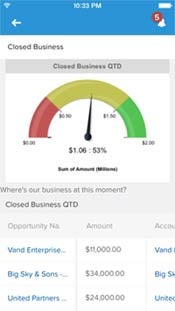Given the simple fact that most salespeople should be spending the majority of their day outside the office with customers, it only makes sense that Salesforce.com would extend the reach of its Salesforce1 application service to the smartphone. But many organizations may find the degree to which that smartphone application can be customized to be quite surprising.
Michael Peachey, senior director for solutions marketing at Salesforce.com, says the Salesforce Mobile App being updated via the summer release of Salesforce1 cloud application service can be customized in a manner that ranges from a simple cosmetic change that allows a company to apply its own branding to the application to the inclusion of custom workflows that can invoke a broad range of application programming interfaces (APIs).
Peachey says those customizations can be created by either “power users” that have mastered the declarative application development tools that Salesforce.com provides or professional developers that need to go deeper into the Salesforce1 application environment using a software development kit (SDK) that, for example, provides connectors to SAP applications and the MuleSoft cloud integration platform. Most recently, Salesforce.com extended the reach of the Salesforce1 application to all the applications that run on the Heroku cloud platform owned by Salesforce.com.

In fact, Peachey says a few customers have already begun using the software development kit (SDK) to incorporate voice commands inside the Salesforce Mobile App using the Siri technology that Apple makes available on the iPhone.
As an application platform that now provides, among other things, social networking and file-sharing capabilities alongside a CRM application, Salesforce is trying to position Salesforce1 as the dominant enterprise application that workers are going to wind up spending the most amount of time using. The degree to which that will occur remains to be seen but making Salesforce1 available as a smartphone application is a significant step toward attaining that goal.



